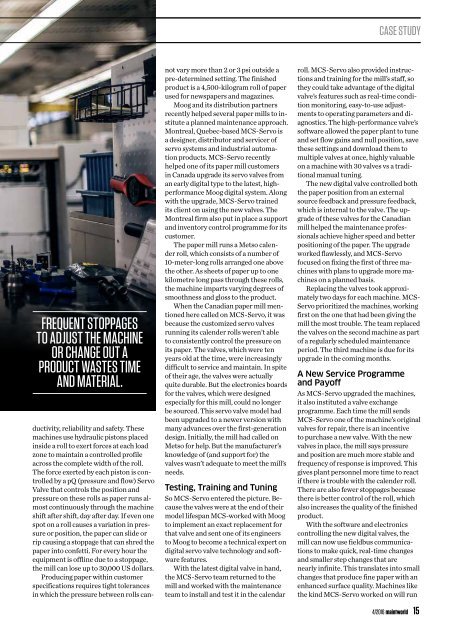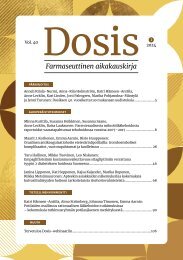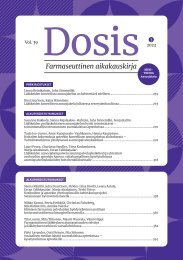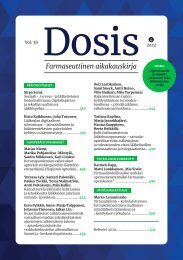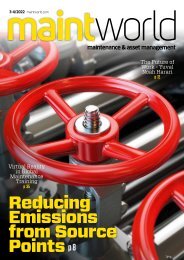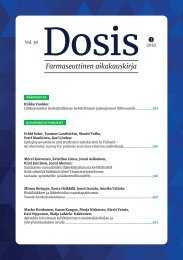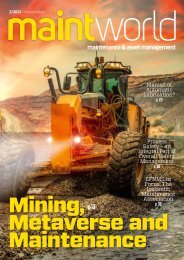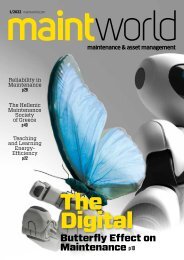Maintworld 4/2016
In this issue: Towards Better Asset Performance Modelling Paper Mills’ Planned Maintenance Approach Ultrasound in Asset Condition Management Asset Criticality Ranking
In this issue:
Towards Better Asset Performance Modelling
Paper Mills’ Planned Maintenance Approach
Ultrasound in Asset Condition Management
Asset Criticality Ranking
You also want an ePaper? Increase the reach of your titles
YUMPU automatically turns print PDFs into web optimized ePapers that Google loves.
CASE STUDY<br />
FREQUENT STOPPAGES<br />
TO ADJUST THE MACHINE<br />
OR CHANGE OUT A<br />
PRODUCT WASTES TIME<br />
AND MATERIAL.<br />
ductivity, reliability and safety. These<br />
machines use hydraulic pistons placed<br />
inside a roll to exert forces at each load<br />
zone to maintain a controlled profile<br />
across the complete width of the roll.<br />
The force exerted by each piston is controlled<br />
by a pQ (pressure and flow) Servo<br />
Valve that controls the position and<br />
pressure on these rolls as paper runs almost<br />
continuously through the machine<br />
shift after shift, day after day. If even one<br />
spot on a roll causes a variation in pressure<br />
or position, the paper can slide or<br />
rip causing a stoppage that can shred the<br />
paper into confetti. For every hour the<br />
equipment is offline due to a stoppage,<br />
the mill can lose up to 30,000 US dollars.<br />
Producing paper within customer<br />
specifications requires tight tolerances<br />
in which the pressure between rolls cannot<br />
vary more than 2 or 3 psi outside a<br />
pre-determined setting. The finished<br />
product is a 4,500-kilogram roll of paper<br />
used for newspapers and magazines.<br />
Moog and its distribution partners<br />
recently helped several paper mills to institute<br />
a planned maintenance approach.<br />
Montreal, Quebec-based MCS-Servo is<br />
a designer, distributor and servicer of<br />
servo systems and industrial automation<br />
products. MCS-Servo recently<br />
helped one of its paper mill customers<br />
in Canada upgrade its servo valves from<br />
an early digital type to the latest, highperformance<br />
Moog digital system. Along<br />
with the upgrade, MCS-Servo trained<br />
its client on using the new valves. The<br />
Montreal firm also put in place a support<br />
and inventory control programme for its<br />
customer.<br />
The paper mill runs a Metso calender<br />
roll, which consists of a number of<br />
10-meter-long rolls arranged one above<br />
the other. As sheets of paper up to one<br />
kilometre long pass through these rolls,<br />
the machine imparts varying degrees of<br />
smoothness and gloss to the product.<br />
When the Canadian paper mill mentioned<br />
here called on MCS-Servo, it was<br />
because the customized servo valves<br />
running its calender rolls weren’t able<br />
to consistently control the pressure on<br />
its paper. The valves, which were ten<br />
years old at the time, were increasingly<br />
difficult to service and maintain. In spite<br />
of their age, the valves were actually<br />
quite durable. But the electronics boards<br />
for the valves, which were designed<br />
especially for this mill, could no longer<br />
be sourced. This servo valve model had<br />
been upgraded to a newer version with<br />
many advances over the first-generation<br />
design. Initially, the mill had called on<br />
Metso for help. But the manufacturer’s<br />
knowledge of (and support for) the<br />
valves wasn’t adequate to meet the mill’s<br />
needs.<br />
Testing, Training and Tuning<br />
So MCS-Servo entered the picture. Because<br />
the valves were at the end of their<br />
model lifespan MCS-worked with Moog<br />
to implement an exact replacement for<br />
that valve and sent one of its engineers<br />
to Moog to become a technical expert on<br />
digital servo valve technology and software<br />
features.<br />
With the latest digital valve in hand,<br />
the MCS-Servo team returned to the<br />
mill and worked with the maintenance<br />
team to install and test it in the calendar<br />
roll. MCS-Servo also provided instructions<br />
and training for the mill’s staff, so<br />
they could take advantage of the digital<br />
valve’s features such as real-time condition<br />
monitoring, easy-to-use adjustments<br />
to operating parameters and diagnostics.<br />
The high-performance valve’s<br />
software allowed the paper plant to tune<br />
and set flow gains and null position, save<br />
these settings and download them to<br />
multiple valves at once, highly valuable<br />
on a machine with 30 valves vs a traditional<br />
manual tuning.<br />
The new digital valve controlled both<br />
the paper position from an external<br />
source feedback and pressure feedback,<br />
which is internal to the valve. The upgrade<br />
of these valves for the Canadian<br />
mill helped the maintenance professionals<br />
achieve higher speed and better<br />
positioning of the paper. The upgrade<br />
worked flawlessly, and MCS-Servo<br />
focused on fixing the first of three machines<br />
with plans to upgrade more machines<br />
on a planned basis.<br />
Replacing the valves took approximately<br />
two days for each machine. MCS-<br />
Servo prioritized the machines, working<br />
first on the one that had been giving the<br />
mill the most trouble. The team replaced<br />
the valves on the second machine as part<br />
of a regularly scheduled maintenance<br />
period. The third machine is due for its<br />
upgrade in the coming months.<br />
A New Service Programme<br />
and Payoff<br />
As MCS-Servo upgraded the machines,<br />
it also instituted a valve exchange<br />
programme. Each time the mill sends<br />
MCS-Servo one of the machine’s original<br />
valves for repair, there is an incentive<br />
to purchase a new valve. With the new<br />
valves in place, the mill says pressure<br />
and position are much more stable and<br />
frequency of response is improved. This<br />
gives plant personnel more time to react<br />
if there is trouble with the calender roll.<br />
There are also fewer stoppages because<br />
there is better control of the roll, which<br />
also increases the quality of the finished<br />
product.<br />
With the software and electronics<br />
controlling the new digital valves, the<br />
mill can now use fieldbus communications<br />
to make quick, real-time changes<br />
and smaller step changes that are<br />
nearly infinite. This translates into small<br />
changes that produce fine paper with an<br />
enhanced surface quality. Machines like<br />
the kind MCS-Servo worked on will run<br />
4/<strong>2016</strong> maintworld 15


